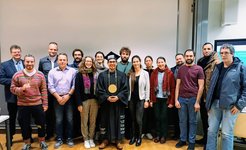Sebastián Espinel Ríos successfully defended his PhD thesis!
Research focused on modeling, optimization, control, and estimation methods for metabolic cybergenetics

Sebastián Espinel Ríos began the IMPRS program on September 1, 2019, marking the beginning of a four-year journey that ended in the successful defense of his thesis with “summa cum laude” on December 19, 2023. Reflecting on this significant chapter in his academic career, Sebastián Espinel Ríos wants to share his experiences and insights gained from the program that has profoundly shaped his professional career.
Choosing to pursue a PhD within the IMPRS framework was, in his own words, the best decision he could have made for pursuing his PhD. The program's distinctive feature lies in the flexibility it provides, allowing students to design and plan their own projects from the outset. This autonomy was instrumental in shaping the research journey of Sebastián Espinel Ríos, enabling him to explore state-of-the-art advancements in his fields of interest during the initial semester, thereby identifying research challenges and opportunities, as well as learning new methods. This initial phase of exploration laid the foundation for a concrete research project with clearly defined objectives and timeline, thereby instilling a sense of ownership and direction in his work.
Furthermore, the IMPRS program's interdisciplinary nature proved to be a significant advantage. Working collaboratively with multiple PhD advisors and a mentor offered him a unique opportunity to leverage diverse expertise. Sebastián Espinel Ríos also emphasizes the fact that being recognized as a scientific employee at the Max Planck Institute boosted the dynamics of his PhD research journey. Simultaneously, the dual affiliation with OVGU granted access to a spectrum of university resources, including courses, workshops, activities, and free public transportation.
In his research, Sebastián Espinel Ríos worked on modelling, optimization, control, and estimation methods for metabolic cybergenetics. The core idea of metabolic cybergenetics is to dynamically manipulate intracellular metabolic fluxes via external dynamic control of the expression of key metabolic enzymes to maximize production efficiency, ideally in a closed-loop and fully automated manner. To do so, he explored topics such as macro-kinetic and constraint-based dynamic modelling, hybrid modelling supported by neural networks and Gaussian processes, model-based optimal and predictive control, and soft sensors such as moving horizon estimators.
During his research, he was co-supervised by Dr.-Ing. Steffen Klamt and Dr. Katja Bettenbrock from the group Analysis and Redesign of Biological Networks at the Max Planck Institute and Prof. Dr.-Ing. Rolf Findeisen from the Control and Cyber-Physical Systems Laboratory at TU Darmstadt. Their combined expertise in metabolic engineering, genetic engineering, synthetic biology, modeling, control, optimization, and machine learning provided a comprehensive foundation for Sebastián Espinel Ríos's research endeavors.

Embarking on the journey towards a PhD was not without its share of hurdles. Upon his arrival in Magdeburg, he found himself grappling with the unfamiliarity of the German language. Despite the IMPRS adopting English as its working language, navigating the city and the country required a proficiency in German. Fortunately, the IMPRS offered support in the form of free German language courses, enabling Sebastián Espinel Ríos to attain the confidence needed to navigate daily tasks independently. The initial year posed additional challenges when his original PhD mentor departed from academia. However, he was fortunate to meet highly skilled doctoral and postdoctoral researchers in the groups he worked at, which helped him work more effectively.
One of the program's highlights was an international research stay at the Avalos Lab, Princeton University—an opportunity fully supported by the IMPRS. This experience enabled Sebastián Espinel Ríos to foster collaborations with international experts and gain exposure to diverse research and working cultures.
As he transitions into the next phase of his career, he intends to apply the skills acquired during his PhD to advance biotechnological applications, focusing on developing methodologies for smart bioprocessing. This includes working on concepts such as digital twins, employing machine learning for supporting and driving real-time bioprocess optimization and control, and furthering the digitalization of bioprocesses.
To future IMPRS students, Sebastián Espinel Ríos offers a piece of advice based on his experiences: "The PhD journey has its ups and downs, but in the end, it will work out for everyone. Time really does fly! Enjoy the journey and make sure you work on topics that you are passionate about."
He extends heartfelt gratitude to Dr.-Ing. Klamt, Dr. Bettenbrock, and Prof. Findeisen for their unwavering support throughout his PhD journey. Additionally, his appreciation goes to the IMPRS program for providing funding and invaluable research opportunities.
Sebastián Espinel Ríos wholeheartedly recommends the IMPRS program in Magdeburg to anyone intrigued by advanced interdisciplinary engineering research. The blend of high-quality research at the Max Planck Institute and OVGU, coupled with the well-structured IMPRS PhD program, offers a unique and enriching experience that facilitates both professional and personal growth.













